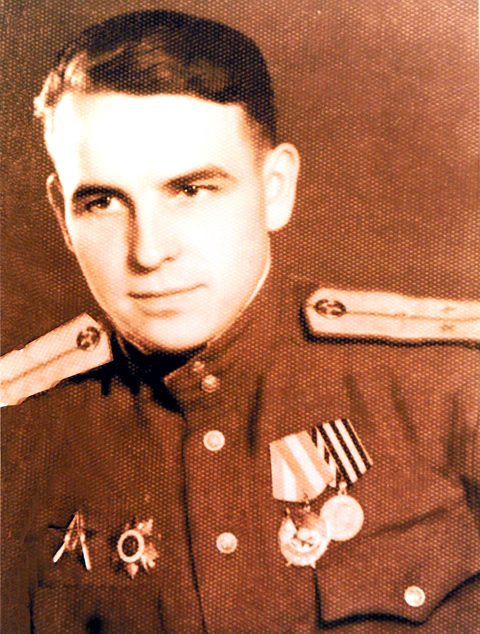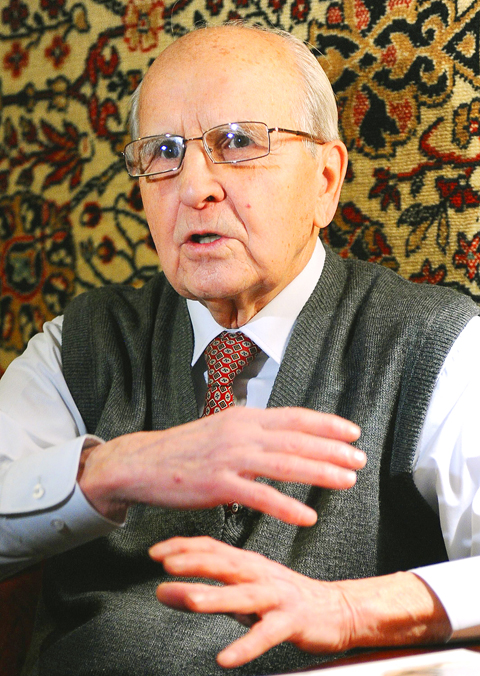Until the last, Ivan Martynushkin knew nothing of the horrors his unit would uncover when the Soviet army fought its way to the barbed wire fences of Auschwitz — Nazi Germany’s most infamous death camp.
Sixty-five years on, he is still haunted by what he saw — memories that have only grown more terrible as he learned the camp’s story.
Some 1.1 million people died at the camp between 1940 and 1945 — 1 million of them Jews from across Nazi-occupied Europe. Some died from overwork and starvation, but most were murdered in the gas chambers.

PHOTO: AFP
“I will remember those things until the end of my days,” the 86-year-old veteran, who headed a gunner unit of the Red Army’s 322nd rifle division that liberated Auschwitz, said in interview at his home in Moscow.
The sprightly, gray-haired veteran sat in his neat apartment surrounded by books and photographs, including one of him with Russian Prime Minister Vladimir Putin. A jacket pinned with war medals hung on the wall.
Martynushkin said it was only when he saw the camp’s barbed wires and his commander ordered the troops to hold their fire that he “guessed that this was some special military zone, that this was something else.”

PHOTO: AFP
For many veterans, the lack of shooting on that day — Jan. 27, 1945 — in the midst of the fiercest weeks of fighting, remains one of their most powerful impressions, Holocaust researcher Ilya Altman said.
Martynushkin recalled the ghostly quiet and acrid “ash-and smoke-filled” air at Auschwitz.
He had seen other Nazi prisoner camps, but as his unit moved along the perimeter of Auschwitz he was staggered.
“It was huge. It went on and on for kilometers,” he remembered. “We started to see groups of people when we reached the fence. They came up to us dressed in prison stripes, some had other clothes on top.”
“After being in such a hell, constantly threatened by death, they were worn, depleted people. The only thing to them were those eyes that reflected a kind of joy — of being freed, the joy that hell had ended and they remained alive,” he said.
As the Soviet troops closed in, 60,000 prisoners had been driven back behind the Nazi lines in a forced “death march” that would be remembered by the survivors as worse than all that had come earlier at the camp.
The few thousands left behind were thought too weak to march, but by some luck escaped being shot in the chaos of the rushed exodus.
Martynushkin turned 21 just days before arriving at Auschwitz, but by that time he had already spent three years at the front.
Desensitized by the scale of suffering he witnessed over the war, he did not realize the full horror of the death camp, he said.
It was only later, when the Nuremberg trials began, that he came to understand what had previously seemed unimaginable.
“Back then when we saw the ovens, our first thought was: ‘Oh well, so they are crematoriums. So people died and they didn’t bury them all,’” he said. “We didn’t know then that those ovens were specially built for the killing of people, to burn those who had been gassed, that kind of systematic killing.”
Auschwitz operated from 1940, a year after the German invasion of Poland. Its victims also included 85,000 non-Jewish Poles, 20,000 gypsies, 12,000 non-Jewish other European nationals and about 15,000 Soviet prisoners of war.
“It was unlike any other war. It was a war over the existence of entire peoples,” Martynushkin said. “We were able to see this plan at Auschwitz. Everyone was there, representatives of all the European nations.”
He was planning to travel to Poland with a handful of other surviving Soviet soldiers for the 65th anniversary tomorrow of the day they liberated Auschwitz.

Incumbent Ecuadoran President Daniel Noboa on Sunday claimed a runaway victory in the nation’s presidential election, after voters endorsed the young leader’s “iron fist” approach to rampant cartel violence. With more than 90 percent of the votes counted, the National Election Council said Noboa had an unassailable 12-point lead over his leftist rival Luisa Gonzalez. Official results showed Noboa with 56 percent of the vote, against Gonzalez’s 44 percent — a far bigger winning margin than expected after a virtual tie in the first round. Speaking to jubilant supporters in his hometown of Olon, the 37-year-old president claimed a “historic victory.” “A huge hug

Two Belgian teenagers on Tuesday were charged with wildlife piracy after they were found with thousands of ants packed in test tubes in what Kenyan authorities said was part of a trend in trafficking smaller and lesser-known species. Lornoy David and Seppe Lodewijckx, two 19-year-olds who were arrested on April 5 with 5,000 ants at a guest house, appeared distraught during their appearance before a magistrate in Nairobi and were comforted in the courtroom by relatives. They told the magistrate that they were collecting the ants for fun and did not know that it was illegal. In a separate criminal case, Kenyan Dennis

A judge in Bangladesh issued an arrest warrant for the British member of parliament and former British economic secretary to the treasury Tulip Siddiq, who is a niece of former Bangladeshi prime minister Sheikh Hasina, who was ousted in August last year in a mass uprising that ended her 15-year rule. The Bangladeshi Anti-Corruption Commission has been investigating allegations against Siddiq that she and her family members, including Hasina, illegally received land in a state-owned township project near Dhaka, the capital. Senior Special Judge of Dhaka Metropolitan Zakir Hossain passed the order on Sunday, after considering charges in three separate cases filed

APPORTIONING BLAME: The US president said that there were ‘millions of people dead because of three people’ — Vladimir Putin, Joe Biden and Volodymyr Zelenskiy US President Donald Trump on Monday resumed his attempts to blame Ukrainian President Volodymyr Zelenskiy for Russia’s invasion, falsely accusing him of responsibility for “millions” of deaths. Trump — who had a blazing public row in the Oval Office with Zelenskiy six weeks ago — said the Ukranian shared the blame with Russian President Vladimir Putin, who ordered the February 2022 invasion, and then-US president Joe Biden. Trump told reporters that there were “millions of people dead because of three people.” “Let’s say Putin No. 1, but let’s say Biden, who had no idea what the hell he was doing, No. 2, and